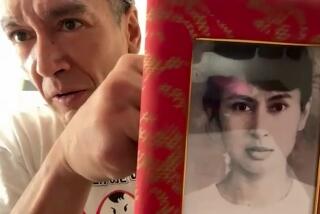In Myanmar, little hope for U.N. visit
- Share via
BANGKOK — Former political prisoner Win Tin says he wasn’t surprised that U.N. Secretary-General Ban Ki-moon’s visit to Myanmar to plead for the release of pro-democracy leader Aung San Suu Kyi ended in failure.
Ban said Saturday that he was “deeply disappointed” that Senior Gen. Than Shwe refused to allow him to see Suu Kyi, adding that she should be released “without delay.” He said Myanmar’s human rights record was a matter of serious concern.
But Win Tin, 80, a former journalist and founding member of Suu Kyi’s National League for Democracy, said he didn’t expect a breakthrough.
“I am not being cynical, but I expected nothing much from the visit. Even though he came at the invitation of the regime, it can be seen as the regime’s response to worldwide pressure due to Aung San Suu Kyi’s trial,” he said by telephone Saturday from Myanmar, also known as Burma. “If there is no real political progress, we will see Burma under a military dictatorship for many years.”
Since Win Tin was released in September after 19 years in Yangon’s Insein Prison, he has worn his prison uniform as a sign of defiance. Last month, he was barred from testifying on Suu Kyi’s behalf.
Suu Kyi has been detained for nearly 14 of the last 20 years. She was charged with violating her house arrest after an American swam to her home uninvited and stayed there for two days. The American, John Yettaw of Falcon, Mo., is also being held.
Ban said his two-day visit, which ended Saturday, would be used to call for the release of Myanmar’s estimated 2,100 political prisoners, promote dialogue between the regime and the opposition and assure a credible vote in general elections scheduled for next year.
Historian Thant Myint-U, grandson of U Thant, secretary-general of the U.N. from 1961 to ‘71, said it was unfair to blame Ban for the trip’s failure.
“Many governments were pushing him to go, the same governments that can’t agree among themselves on what to do about Burma,” he said. “As long as the big powers are deadlocked, it’s easy to push the U.N. secretary-general into the limelight, and then blame him for not producing results.”
Pro-democracy opposition and exile groups were left with the largely ineffectual tools they started with: international outcry and economic sanctions.
“The trouble with sanctions is that they are easy to put into effect and very difficult to get rid of. If you want to achieve an objective, sometimes you have to give people a way out,” said David Steinberg, a Myanmar expert at Georgetown University.
Meanwhile, Win Tin says he is practically homeless. His property was seized by the government when he went to jail on July 4, 1989, and his friends have been denied the government approval needed to house him.
Born into a poor family in north Yangon, also known as Rangoon, Win Tin dreamed of joining Myanmar’s struggle for independence from the British. When he was a teenager, he met Aung San, the nation’s independence hero and father of Aung San Suu Kyi. Win Tin asked if he could join the resistance and was rebuffed.
“Aung San plainly said, ‘Stick with your studies. There are many people to fight. The time will come for you,’ ” Win Tin said.
When an uprising broke out in 1988, he became a founding member of NLD and a close aide to Suu Kyi. He was arrested a year later and jailed, and his sentence was extended after he managed to smuggle out a report to a United Nations official about torture and other human-rights violations rampant in Myanmar’s jails.
According to the Committee to Protect Journalists, Win Tin had repeatedly refused to sign a letter promising to give up his political activities as a condition of his release. Local news reports have said that Win Tin could be jailed for refusing to return his prison-issue dungarees. He says he will continue to wear the prison blues until Myanmar is free.
“I remember Daw Suu Kyi’s response to this kind of warning about her security. She said, ‘If a quack shoots me with a pistol, then the whole world will know where this bullet comes from,’ ” he said.
--
McDermid is a special correspondent. Special correspondent Swe Win contributed to this report.
More to Read
Sign up for Essential California
The most important California stories and recommendations in your inbox every morning.
You may occasionally receive promotional content from the Los Angeles Times.













